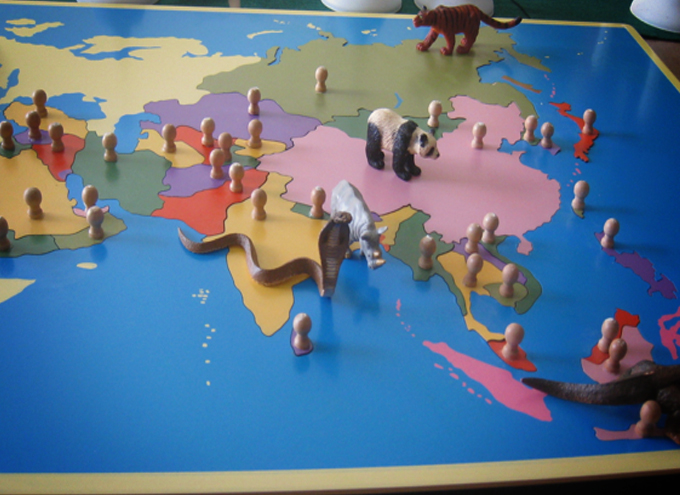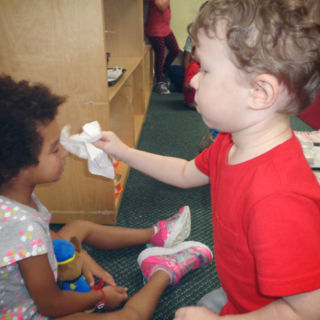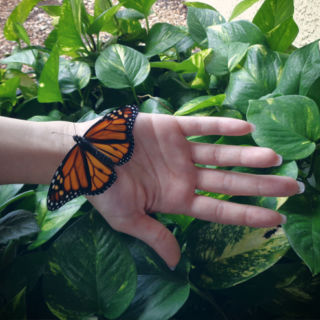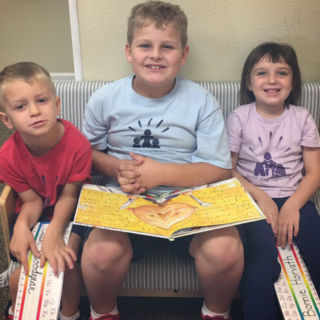
The classroom “work cycle” … it is such a mundane name to refer to such a magical period of time in our children’s day.
This extended uninterrupted period of time fosters independence and confidence. The work cycle is where children can choose their activities from what they have been presented, can join a small group activity, or may receive a presentation of new work. In addition to the Montessori materials, the Montessori work cycle includes any practical life activities such as painting, gardening, polishing, table setting, etc. It also includes music and art activities and outside exploration (looking at the shape of leaves, finding insects, watering the garden). All of these activities are considered Montessori work and the children are free within certain limits to choose their own activities. Small groups happen spontaneously and there is no timetable for these activities. As children choose a work, complete the work, return the work, then move on to another work, they are building concentration, coordination and a sense of order.
An example of a day for one 4 year old may look vastly different from his friend’s. It is important to note that the two to three hour cycle allows a child to establish his own routines with work that is developmentally appropriate for him. The extended cycle allows for spontaneous exploration and satisfaction as joyful children progress through their work at their own pace. Through this open time, the child gains the confidence and the ability to make good choices, but even this is a process. A child may at times need guidance from peers, the assistants or the lead teacher to choose work or may participate more frequently in small groups until they feel more capable to choose work and transition from one piece of work to another.
A morning work cycle through a child’s eyes: The child enters the classroom, places his lunch box and coat neatly in his cubby. This particular child has a morning routine that he has established and likes to follow. He goes to the bathroom and then washes his hands. Then he looks for his favorite insect book and almost always glimpses at that first. After offering to share the book with a friend, they finish reading together and help pick up the collection of books as they prepare for a short circle time.
The child participates in the Pledge of Allegiance, welcomes friends to class and joins in identifying words that begin with the letter of the week. Circle time ends and the child is excited to choose his morning activities, which he completes easily. As he is working on polishing a silver vase in Practical Life, he sees a group forming in the corner of the room and decides to join. He cleans up his materials and puts away his work, quietly joining the group activities. The group is not quite so interesting to him today and after a while he wanders away to get a drink at the fountain and chat with a friend.
He walks slowly around the room and something catches his eye. He had been learning about Asia the day before and he sees the animals of Asia classification work sitting on a shelf. Interested, he takes out a small rug and unrolls it, then takes the tray of work to the rug. He looks at the words, illustrations and animal figurines and matches them for a while. Then goes to the map cabinet and removes the Asia map puzzle which illustrates the countries. This becomes his great work of the morning.
For the rest of the morning, he works, head bent and focused to recreate the puzzle onto paper, color the parts and label them. Groups happen around him, children stop to respectfully watch his work, but he is fairly oblivious. A few times, he is not sure of a label and emerges from his work to ask the teacher for help. She redirects him to an older child who can share his knowledge and they work together for a moment until he is able to carry on on his own. As he finishes, he looks up as if suddenly awakened, amazingly refreshed by his work, not tired at all. He puts his paper in the finished work basket, returns his tray of work to the shelf and joins the group gathering on the rug preparing for a friend’s 5th birthday. Following the brief birthday tradition, he prepares to go outside for free play, then a short story time until he and friends prepare for lunch. The child is content and ready to resume more interesting work for the afternoon work cycle.
Only through freedom and environmental experience is it practically possible for human development to occur.
— Maria Montessori



